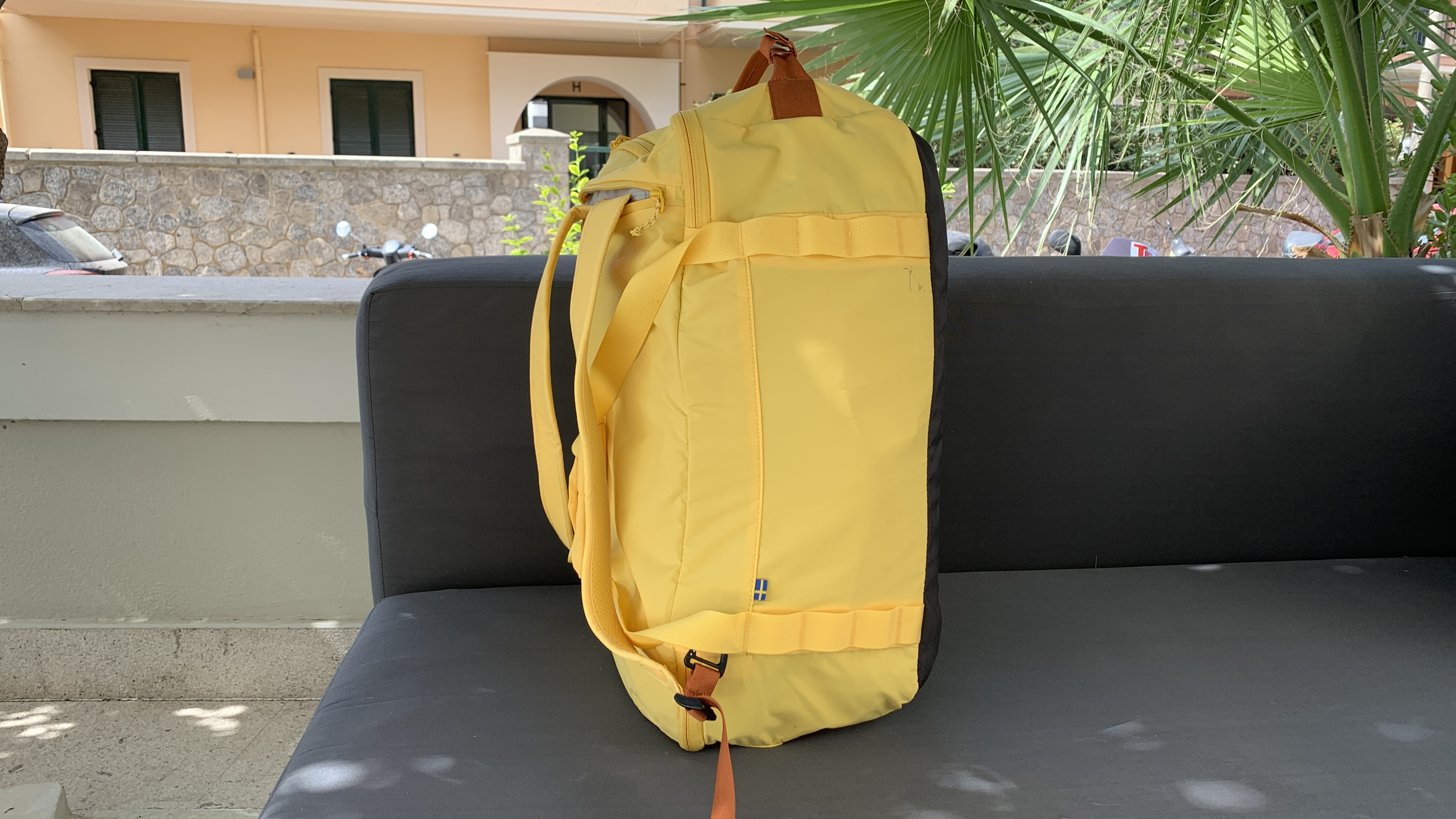Advnture Verdict
Lightweight, roomy and a comfortable carry on your back, there's lots to like about this duffel bag for active travel when you're packing for a long weekend away, though we found a few areas for improvement
Pros
- +
Lightweight and reasonably comfortable to carry
- +
Plenty of room for an active weekend away
- +
Converts into a backpack with stowable straps for easy carry
- +
Small enough to be a carry on
- +
Lots of grab handles
- +
Full clamshell opening for easy access to gear
- +
Four zipped pockets to organize gear
- +
Made using recycled materials and PFC-free DWR
- +
Water-resistant
- +
Dark colored base doesn't show dirt
Cons
- -
Backpack straps can be a little fiddly
- -
No padding
- -
Difficult to access main compartment when using backpack straps
You can trust Advnture
Meet the reviewer
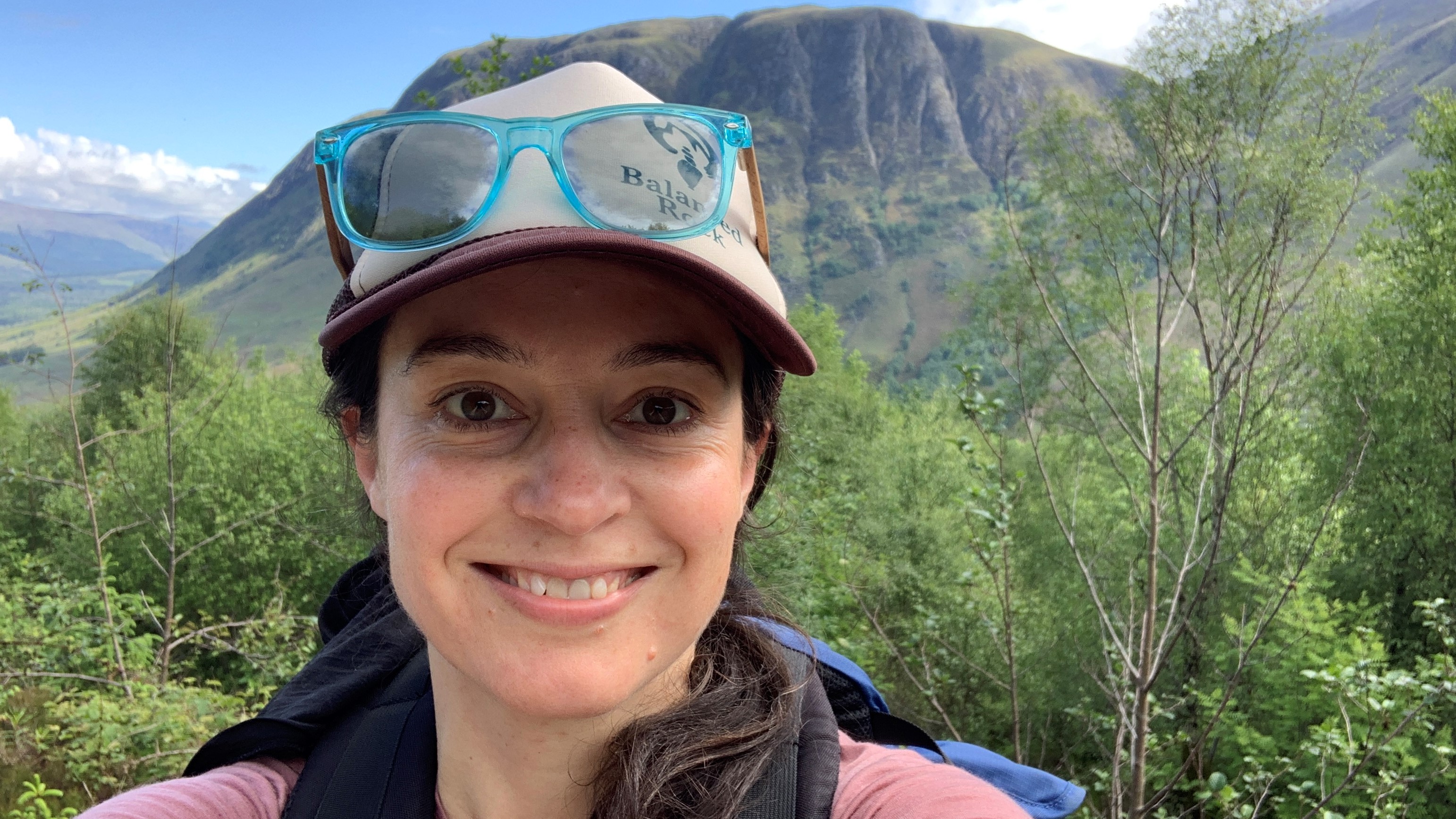
Julia Clarke is a staff writer for Advnture.com and the author of the book Restorative Yoga for Beginners. She loves to explore mountains on foot, bike, skis and belay and then recover on the the yoga mat. Julia graduated with a degree in journalism in 2004 and spent eight years working as a radio presenter in Kansas City, Vermont, Boston and New York City before discovering the joys of the Rocky Mountains. She then detoured west to Colorado and enjoyed 11 years teaching yoga in Vail before returning to her hometown of Glasgow, Scotland in 2020 to focus on family and writing.
Fjällräven High Coast Duffel 36: first impressions
When you're getting away for a long weekend that's going to involve activities like hiking and climbing but you don't want to check a bag, the Fjällräven High Coast Duffel 36 has plenty of room for outdoor gear but isn't likely to get the flight crew too riled up when you want to bring it on board without paying extra.
This spacious duffel bag easily fits hiking and climbing gear for a few days, or everything you need for a more relaxing warm weather break, and has four zipped pockets to help you keep smaller gear, passports and chargers organized. The full clamshell opening makes it easy to pack and rummage through to find gear. You can carry it in one hand using two padded handles, or turn it into a backpack with stowable straps that make it easy to tote around the airport hands-free.
• List price: $120 / £140
• Volume: 22 L / 36 L
• Weight: 1.25 lbs / 570 grams
• Materials: 210D recycled polyamide with a 10,000mm PU coating
• Colors: Mellow yellow, Clay, Black, Navy, Patina green
• Best use: Active travel
The backpack straps can be a little fiddly to secure, and once they're in place you can't easily unzip the main compartment, which is a little frustrating. The back isn't padded, so you'll need to take care with packing, but even still we were pleasantly surprised by how comfortable and breathable it was to wear as a backpack.
Made using recycled 210D recycled polyamide with a 10,000mm PU coating, this duffel is lightweight and water-repellent if you find yourself trekking through a downpour to reach your hostel. It has loads of grab handles for chucking it up into overhead lockers or heaving it in and out of taxis.
It comes in several nice colors, but the part that sits on the ground is black, so when you're wearing it as a backpack you're not showing the entire airport the grimey bottom of your bag. Fjällräven gear is known for being pricey, but we actually think this comes at a reasonable price for a functional, versatile bag.
Fjällräven High Coast Duffel 36: in the field
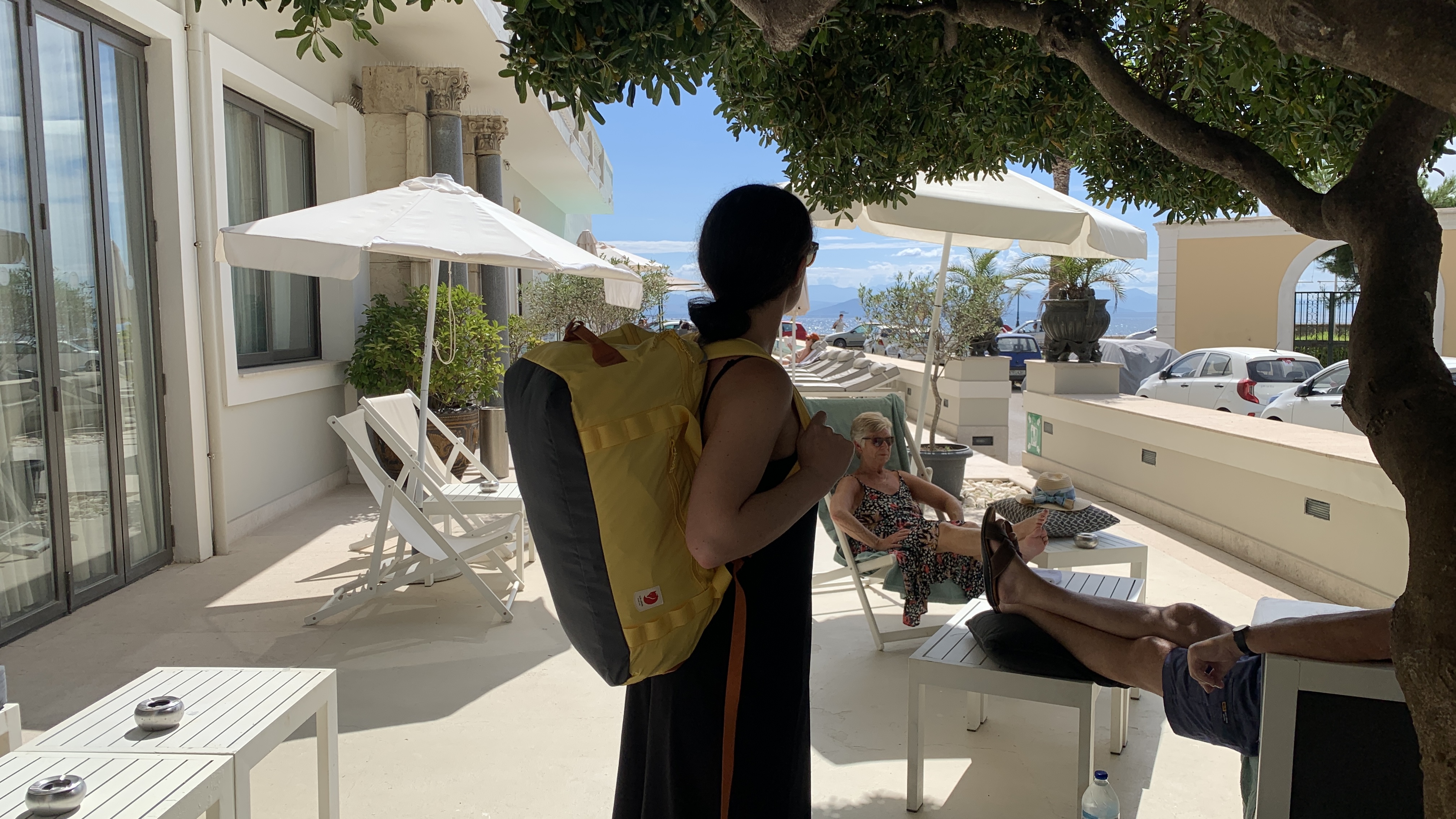
It's difficult to say no to testing gear from Scandi brand Fjällräven and with as much active travel as I do, I had no problem agreeing to try out this duffel bag, particularly since my North Face duffel was commandeered by my boyfriend. I first took this bag on the train to the Lake District for the Arc'teryx Climb Academy where I had to bring a decent amount of gear for hiking and climbing in mild spring weather, before taking it on vacation to the Greek island of Corfu, where I wanted to pack for a week in hot weather without checking a bag.
Here’s how it performed:
All the latest inspiration, tips and guides to help you plan your next Advnture!
Weight and comfort
Because a duffel like this is the type of bag I carry around, and don't check in at the airport, weight does matter and I was really pleased to feel how light it is. The light materials and lack of padding also mean it folds up nicely and packs away when I'm not using it.
Duffel bags are great for fitting lots of kit and accessing that gear, but they're not always the most comfortable carry. Once I had this loaded up, I realized I'd made a bit of a mistake and found a slight flaw in the design. I'd packed my yoga mat and trail running shoes at the bottom, my clothes in the middle and my water bottle and books at the top for easy access during my floght.
Naturally I used the mesh pockets in the top to pack gear like my phone chargers, toiletries, passport and books. However, that's the part that was going to be against my back when wearing this as a backpack, so I was expecting it to be really uncomfortable when worn on my back, especially since the lid isn't padded, but it wasn't too bad at all.
It may not have the contoured design or chest strap of a hiking backpack and I'm not saying I'd wear it up a mountain, but it was actually pretty comfortable to wear on and off over the course of a few hours between getting to the airport, going through security and queuing to board the plane. It's also nice and breathable in hot weather.
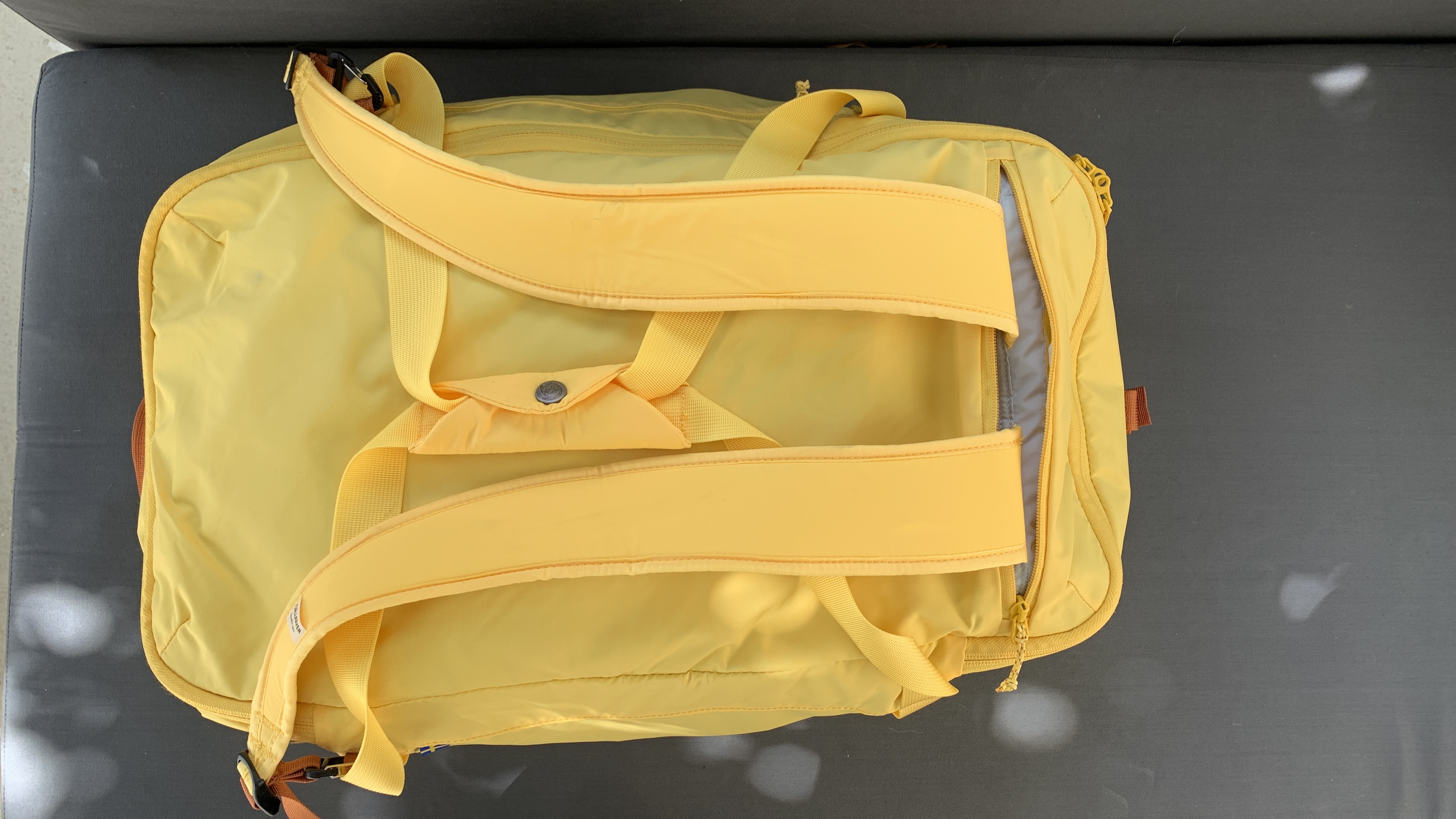
Capacity and performance
I tested the 36-liter duffel and thanks to the shape and clamshell opening, it easily fits more gear than a 36-liter backpack. For my first trip, I was able to load it up with hiking clothes for a few days as well as my climbing helmet and a yoga mat, and for Corfu, I was able to pack six day's worth of summer clothes plus running shoes, a yoga mat, toiletries, water bottle, a daypack and books and still have extra room. The main compartment is just one big space, so if it was half empty your gear might roll around, but there are a few zipped pockets to organize gear.
Once it was packed, I pulled out the backpack straps to wear it to the airport and found the clips on them to be a little fiddly. Once they were clipped in, I also realized that I then couldn't unzip the main compartment, which was a little annoying, and meant I ended up using a fanny pack to keep my wallet, phone and passport close to hand.
Without compression straps, all the gear inside does obviously sag towards the bottom when it's used as a backpack and it feels slightly unwieldy when full, plus when not packed thoughtfully it can feel a little lopsided.
I didn't pay for a hold bag and I was a little nervous I'd get hassle for bringing it on board without paying extra as it looks bigger than a backpack, but it fit easily under the seat in front of me (easier if you have the middle or window seat than the aisle). It's nice and squashy for stowing overhead too, with tons of grab handles. I also like that the base is black so it doesn't show the dirt after sitting on the ground.
Weather protection and durability
Though I haven't had to endure a rainstorm, this bag is water-repellent which is about all you can ask for. It's definitely not as indestructible as my North Face duffel, but it's good quality and I think can hold up to the type of adventures it's likely to go on, which would be active weekends away and not mountaineering.
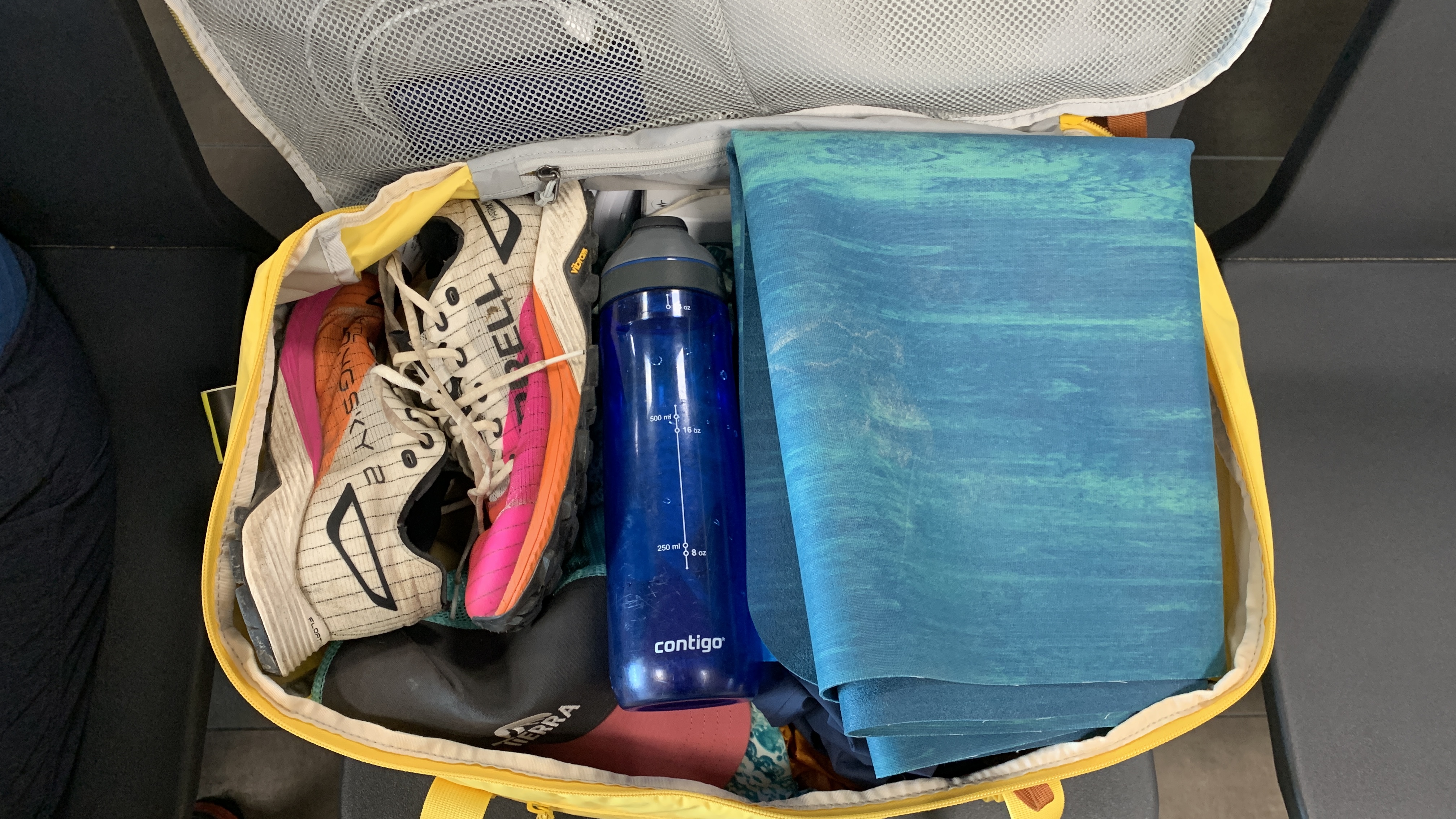
Fjällräven High Coast Duffel 36: the bottom line
This lightweight and roomy duffel bag will hold everything you need for a few days away when you want to haul some gear but don't want to check a bag. It's reasonably comfortable to wear as a backpack, especially if you pack it carefully, and you can easily pack and access your gear. It's also surprisingly affordable for the brand, coming in cheaper than the Fjällräven Kanken Outlong day pack. If you're looking for something sturdier, check out the The North Face Base Camp Duffel which is a little heavier, but very robust.
Julia Clarke is a staff writer for Advnture.com and the author of the book Restorative Yoga for Beginners. She loves to explore mountains on foot, bike, skis and belay and then recover on the the yoga mat. Julia graduated with a degree in journalism in 2004 and spent eight years working as a radio presenter in Kansas City, Vermont, Boston and New York City before discovering the joys of the Rocky Mountains. She then detoured west to Colorado and enjoyed 11 years teaching yoga in Vail before returning to her hometown of Glasgow, Scotland in 2020 to focus on family and writing.
